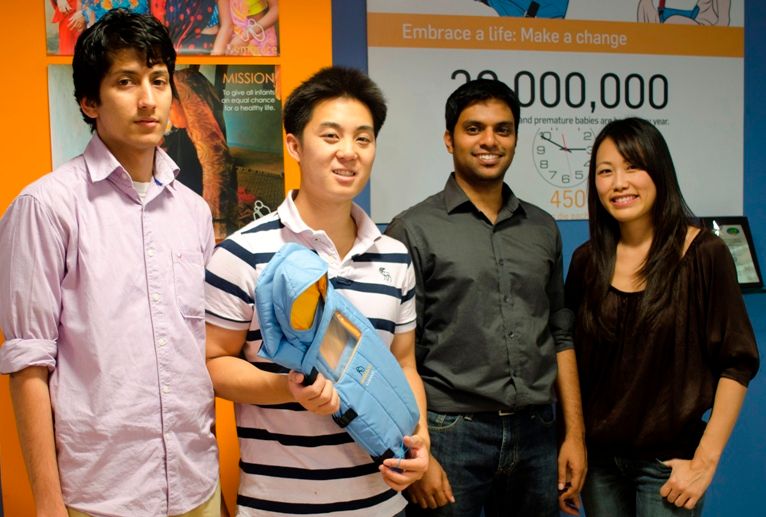Embracing new born lives in a warm cuddle, Embrace Innovations
By Raina Assainar
It is aptly said that ‘a child gives birth to a mother’, for a mother is born with the birth of the child, but for a mother to lose her baby within few months of the birth, is the worst tragedy a human being can face. And sadly, globally, four million babies out of 20 million premature babies die every year. As many as, 40 percent of these premature babies are born in India. So when four classmates from Stanford learnt about this staggering and depressing fact, they decided to find a solution to it and the result was ‘Embrace Nest’, a product by Embrace Innovations. This innovative product is a low cost infant warmer, designed specifically for resource constrained areas with limited or no electricity.

Initially, conceived as a class project for the Entrepreneurial Design for Extreme Affordability, Stanford University in the year 2008, Embrace Innovations as a venture came into existence in the year 2010. By mid-2011, Embrace Nest was launched for commercial purpose. While working on the class project to come up with a low-cost incubator design that could help save premature babies born into poverty, the team travelled to Kathmandu, Nepal to better understand the needs of a new born in a rural setup. Embrace Nest team comprises of Jane Chen, Rahul Panicker, Naganand Murty and Linus Liang, who moved to India in 2010 to start up their venture in Bangalore. Later, these four Stanford students turned entrepreneurs to develop an inexpensive infant warmer which is a simple, versatile, sleeping bag-like pouch that functions as a low-tech device.

This innovative product has been launched in two types — one that runs on electricity and the another without it. These warmers have three components — a baby interface or sleeping bag, a pouch made of phase-change material and an electric heater to warm the pouch. Users have to first insert the pouch into the electric heater, and once it absorbs the heat, the user has to place the heated pouch into the sleeping bag and place the baby inside. The pouch remains at a temperature of 98.6 degrees for at least four hours. The dynamic phase-change material absorbs the heat from the baby if the baby’s body temperature rises and releases heat if the baby’s body temperature falls. The pouch has an indicator which signals the user when it is time to be recharged, i.e., reheated, and it can be recharged hundreds of times. It helps to keep a premature or a low birth-weight new born at a healthy body temperature. The product is easy to sanitize and can be heated multiple times.
The incubators usually available in hospitals are very costly as compared to the Embrace baby warmers and hence, this low cost innovative equipment is the right option for hospitals in rural areas. The states that have embraced these innovative baby warmers in large numbers are Karnataka, Rajasthan, Kerala and Uttar Pradesh. Embrace Innovations has appointed project staff in rural areas in these states who regularly visit hospitals and homes to educate about the product. “Ever since we started Embrace out of Stanford in 2008, we have been committed to our mission of providing all infants an equal chance of a healthy life. That is also why we decided to launch our product first in India. Our country has the highest number of infant deaths globally,” said Rahul Panicker, co-founder and president, products at Embrace Innovations.
The venture according to Rahul has come a long way since launch in India in mid-2011. But the journey has not been without challenges. “Vendors would not keep their commitments, probably also because we are a start-up. This affected our product development and production timelines,” says Rahul. Another challenge was that of getting good talent in areas such as product innovation and product management, and experienced designers were hard to find. This was particularly important because the company is driven by design innovation.
However these challenges would face in front of the many like-minded people they came across in their course of work. “We are heartened by those in the system who want good things for our country, and by the millions of mothers and fathers who will go to extraordinary lengths for their young families,” says Rahul. The product is now being used in hundreds of cities and towns. Governments in states such as Karnataka, Kerala and Rajasthan have deployed the Embrace product in government healthcare facilities. And basis the progress they have made so far, Embrace is hoping to make a difference in the lives of 1 million babies in the next five years.
In a country where majority of babies are born in rural homes, Embrace Nest is a boon to give young ones an equal chance at life. The product costs only a fraction of traditional incubators, is easily affordable and has the power to affect millions of lives especially in the rural India.











